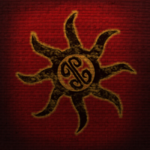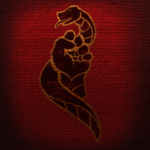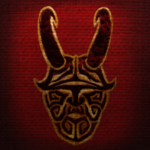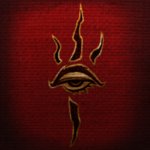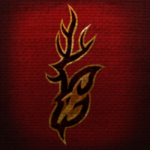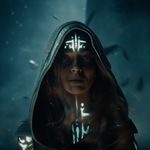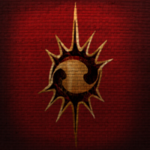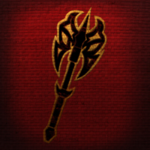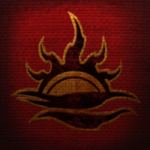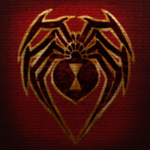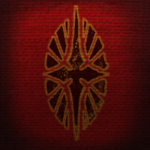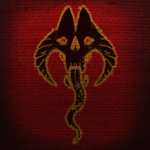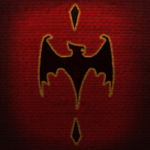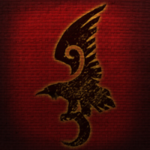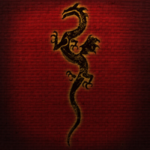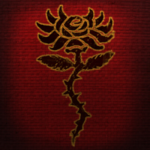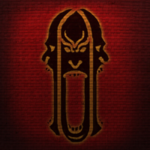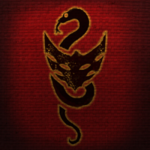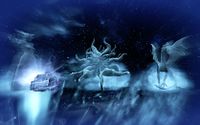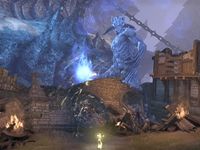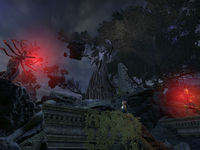Lore:Daedric Princes
—Sir Cadwell of Codswallop[1]
Daedric Princes (also known as Daedric Regents,[2] Daedra Lords†,[3][4][5] Demon Lords of Misrule,[6] Lords and Ladies of Oblivion,[7] Dark Princes, gods of torment,[8] and the Second Litter to the Khajiit)[9][10] are the most powerful of the Daedra, and thus most commonly worshipped as gods.[11][3] Each has a particular sphere, which it is said to govern. In fact, Demiprince Fa-Nuit-Hen stated that "a broad and well-defined sphere of influence that enables clarity of purpose and focused expression of will" is what made a Prince a Prince.[12] In various cultures, the Princes are viewed as siblings,[11] with they themselves having been known to refer to eachother as such, regardless of their actual origins.[13][14] Daedric Princes may assume a typically masculine or a typically feminine form, sometimes both.[15] They are usually referred to as Princes regardless of what gender they appear most frequently as.
The various Daedric Princes and their spheres are listed below. In all, there are seventeen powerful Princes known to mortals: Azura, Boethiah, Clavicus Vile, Hermaeus Mora, Hircine, Jyggalag, Malacath, Mehrunes Dagon, Mephala, Meridia, Molag Bal, Namira, Nocturnal, Peryite, Sanguine, Sheogorath, and Vaermina.[16] Another Prince, Ithelia has been forgotten by all but Hermaeus Mora and the Vestige.[17]
Each Daedric Prince, with the exception of Jyggalag, is said to have their own plane of Oblivion,[18] over which they have control, with the realms themselves being extensions of their masters.[UOL 1] It is said that Oblivion realms can be infinite in size and shape, and that all proper Oblivion realms, such as the main realms of each Prince, are infinite in scale.[19][UOL 2] The realm of each Prince is said to be fundamentally shaped and curated by their will and change to accommodate their slightest whim, to the extent that it has been said by some that the Prince is the realm and the realm is the Prince.[20][21][UOL 1] Though for most Daedric beings creating a realm is an enormous undertaking as it requires enormous will and power, the Daedric Princes are said to possess such might that in ages past they formed vast and practically limitless domains around the initial seed of their realm. As such some of them are known to also have sway over Adjunct Realms or border realms, such as the Infinite Archive of Apocrypha, which lie within their plane's "greater fabric".[21]Some of these border realms have been described as having extensive or even infinite scale, and not lying within the same time and space as their Prince's main plane.[22][23][24]. The limits on their planes, powers, and influence are not readily understood, as there are over 37,000 other planes (such as the Soul Cairn and the Chimera of Desolation, as well as chaos realms and pocket realms) over which they are not known to exert control,[18][25][26] and indeed there exists far more than that, with accounts from the Daedra describing the minor realms in Oblivion as overall being infinite in both number and complexity.[20]. The planes of Oblivion are said to exhibit infinite variation, much like the Daedra that inhabit them, thus it is said they share little in common, being "the very definition of change and variation, manifesting all possibilities, and validating all understanding and misunderstanding".[27][28] Indeed, it is said that what the mortal senses perceive while in an Oblivion realm is crafted from illusion and metaphor, the result of their mind attempting to make sense of the surrounding chaos. Because of this phenomenon things like the "grass" one might perceive while in an Oblivion realm are actually just the memory of that thing as interpreted by the mortal mind.[29] The smaller planes are said to often "twist into hyperogonal paradoxes" in an attempt to resist any sort of order being imposed on them, or wink in and out of existence, making it difficult for Daedra to gain a foothold there.[20] The term "pocket realm" is said to refer to any minor plane of Oblivion, whether it is autonomous from the rule of a Daedric Prince, semi-autonomously under the rule of a Prince-appointed "functionary", or fully incorporated by a Prince.[12] The realms comprising Oblivion are described as being part of a different universe or a different dimension in relation to Mundus.[30]
The Daedric Princes seem to view Men and Mer as little more than minor amusements, occasionally applauding the actions of mortals when they exceed their expectations. They do not know the mortal sense of "good" and "evil", and usually have extremist tendencies, which is why Men and Mer fear them greatly. However, several princes do seem to take genuine pleasure in tremendous acts of devastation, in particular Boethiah, Molag Bal, Vaermina, Mehrunes Dagon, and Peryite.
Although the beings are considered evil by most, they are widely worshipped in the realms of Tamriel. Elaborate shrines are created to honor the Daedra as gods. They often take a keen interest in their worshippers, and it is speculated that this is either because of the obvious ego-gratification of being somebody's god, or because the Daedra like to keep an eye on potential future subjects (assuming people of demonic disposition enter Oblivion after death, that is; there are as many afterlife theories as there are religions in the world). Mainstream religious authorities discourage Daedra worship, and often mount witch-hunting expeditions to drive out Daedra worshippers from the local area. During these encounters, they are often surprised at the marginal sanity that comes of worshipping the Daedric Princes. For the most part, however, dealing with the Daedra, one gets the distinct impression of being mused over as a person peering under an upturned rock may momentarily wonder at the lives of the bugs living ignorantly there.
The Daedric Princes can be summoned, and there is a popular notion that the summoned lords will then give the summoner a quest or task to fulfill and that the quest, once completed, will make the questor richly rewarded. Mostly these tasks are merely for the entertainment of the Daedra. However, this is probably not true of most Daedra summons, and the summoner would do well to consider the consequences of his actions in advance. A consecrated shrine is the most reliable conduit for contacting a Daedric Prince, though there are other ways to make contact with the powers of Oblivion.[31]
While Aedra and Daedra are precisely defined, there are still some beings who challenge this dichotomy in some respects. Malacath, who legend holds was once the Aedra Trinimac, is particularly hostile to other Daedra; he even created Scourge, Bane of Daedra.[16][4] According to Mankar Camoran, Lorkhan is a Daedric Prince whose sphere is Tamriel.[32] However, this is uncorroborated, and little is known of the mysterious Trickster deity; while some stories suggest Lorkhan was impervious to death, similar to a Daedra, he is also credited with helping to bring about creation (in fact, per many sources, it was allegedly his idea).[33][34] Obscure stories also question the origins of Meridia[35] and Mehrunes Dagon.[UOL 3]
Just like with other beings, each reality along the Many Paths contains its own version of each entity, be they mortal or Daedra, even deities such as the Daedric Princes have their own alternate versions within the realities. These alternate versions are said to be "reflections" of one another: different in some ways, like images in a cracked mirror, but originating from the same seed. However, there is at least one reality where concepts such as magic and Daedra do not exist at all.[36]
For information on other Daedric creatures, and the characteristics of Daedric beings more broadly, see the entry on Daedra.
Azura[edit]
Azura of the Crimson Gate, also known as: Queen of Dawn and Dusk, the Mother Soul, Moonshadow, Mother of the Rose, Queen of the Night Sky, Twilight Queen, the Rim of all Holes, the Cosmic Severer, and called Azurah by the Khajiit, is a Daedric Prince whose sphere is dawn and dusk—the magic in-between realms of twilight—as well as mystery and magic, fate and prophecy, and vanity and egotism. Azura is one of the few Daedra who maintains the appearance of being "good" by mortal standards, and reportedly feels more concern for the well-being of her mortal subjects than other Daedric Princes. It is said she wants their love above all else, and for her worshippers to love themselves; it pains her when they do not. This attitude leads to an extremely devoted following. She is also one of the few Princes who constantly maintains a female image, and is perceived accordingly. In Khajiiti creation myths, Azurah is credited with introducing moon sugar to Khajiit, and this belief is also told within tales aimed at Khajiiti children.
The Five Songs of King Wulfharth claims that Alandro Sul is the immortal son of Azura. While Azura is considered one of the "good" Daedra by the Dunmer of Morrowind, elsewhere she has been known to be allied with Molag Bal, who is known to the Dunmer as one of the Four Corners of the House of Troubles. The people of the Iliac Bay region believe that Azura bewitches some of her followers to become her "lovers" and "virtual slaves". Her followers acknowledge that she is "cruel but wise".
In addition to being one of her many sobriquets, "Moonshadow" is also the name of Azura's realm in Oblivion. Azura's Star, the Twilight Star, is visible at dawn and dusk low on the horizon below the constellation of the Steed. Her summoning day is Hogithum, a festival on the 21st of First Seed.
For more information, see the main lore article.
Boethiah[edit]
Boethiah (sometimes spelled Boethia or Boet-hi-Ah), known as the Prince of Plots, the Daedra Prince of Cruelty and Torture, the Dark Warrior, Deceiver of Nations, Queen of Shadows, Goddess of Destruction, Hunger, and Fount of Inspiration, He-Who-Destroys and She-Who-Erases, Boethiah the Schemer , The Dark Mistress, and called Boethra by the Khajiit, is a Daedric Prince who rules over deceit, conspiracy, secret plots of murder, assassination, treason, and unlawful overthrow of authority. This sphere is destructive in nature, and Boethiah's destructiveness comes from inspiring the arms of mortal warriors. The Dark Warrior has been described as "cold" and "impersonal", "cruel", and one of the more "demonic" of the Daedra lords. Worshippers are known to hold bloody competitions in Boethiah's honor, battling—even killing—each other, for Boethiah is said to care only for their blood. In Morrowind, the Daedra known as the Hunger, foul creatures that are eternally bone thin, are associated with the Prince.
Boethiah sees battle as a blessing, and is frequently depicted as a great caped warrior, often in a stoic pose. While sometimes described as male, Boethiah is also commonly referred to as female, sometimes within the same text. Notably, Boethiah is usually depicted as male in Morrowind, but is also known for taking the form of a Dunmer "warrior-queen".
She rules from the realm of Attribution's Share. Boethiah often manifests using tricky, unpredictable avatars, which can appear as a male or female of any race. These avatars become involved with important or momentous events, working behind the scenes to achieve an outcome that serves Boethiah's will. They will often challenge mortals, seeking to test the mettle of heroes and commoners alike. After a trial ends, the avatar is likely to vanish, leading to strange and mysterious stories and legends among the participants.
Despite the dark undertones of Boethiah's sphere and influence on Tamriel, the Prince was considered in Morrowind to be one of the three "Good Daedra" and the Anticipation of Almalexia by the old Tribunal Temple, and one of the Reclamations by the New Temple. The Prince of Plots has a scion, the demiprince Fa-Nuit-Hen. Despite this, the information broker Madam Whim believes that the demiprince did not actually originate from Boethiah, while also stating that "Boethiah supports their claim of scionship". In the same interview, Whim would describe how Daedric Princes have been known to adopt scions in the past. In the Five Songs of King Wulfharth, Lorkhan states that Nerevar is the son of Boethiah, one of the strongest Padomaics, but it is unclear how literal the statement was. Molag Bal, as one Corner of the House of Troubles, is considered Boethiah's "arch-enemy" in Morrowind and they are in a perennial fight. Boethiah can be summoned on Gauntlet, the 2nd of Sun's Dusk.
For more information, see the main lore article.
Clavicus Vile[edit]
Clavicus Vile, also known as the Prince of Trickery and Bargains, the Consummate Politician of Oblivion, the Master of Insidious Wishes, and Child-god of the Morningstar, is a Daedric Prince whose sphere is the granting of power and wishes through ritual invocations and pacts. He is seen as one of the more "sophisticated" of the Daedric Princes, and often appears in the guise of a jovial Skaafin, a race of horned Daedra that inhabit the Fields of Regret, his realm in Oblivion.
Clavicus Vile is also known as Nycot. According to some, this name was created by the mortal Nycotic Cult, who didn't have the knowledge to properly read the Daedric alphabet, misreading the first five letters of Vile's Daedric name as "Nycot" upon mistaking the runes for Tamrielic letters. However, the name was used by a Skaafin to refer to Vile over three hundred years before the cult's prominence.
Clavicus finds eternity to be "boring", so he finds entertainment in watching mortals and occasionally meddling in their affairs. He has been known to be the patron to vampires, gracing them with social stature, reason and savvy, allowing them to not only live among regular mortals, but to hold powerful positions in society. However, not all of Vile's machinations are necessarily insidious; he has been known to reward those who, on his direction, eliminate threats to the general public (while still serving his own interests).
Vile is rarely seen without his loyal companion, Barbas. Barbas typically assumes the form of a dog, but is also known to appear as a Scamp named Creeper. The two are so close, Barbas is almost universally depicted alongside his master in artwork and statuary. In fact, Vile has been known to store up to half his power within Barbas. These facts have led to speculation that the pair are, in fact, two halves of the same being.
It is said Clavicus Vile is the most carefully neutral Daedric Prince, though he as at times created alliances, such as his role in The Triad. He is an enemy of Ebonarm. Clavicus Vile's summoning day coincides with the New Life Festival, the 1st of Morning Star.
According to some sources Vile views himself as a playful and fun-loving god who basks in the sun alongside his favorite companion, Barbas. This mindset is said to be reflected in the idyllic form his realm takes, making his domain less a normal place like one would find on Nirn and more a "state of mind". Despite this view of himself Vile's "games" are noted to often be dangerous, making caution necessary when approaching him.
Hermaeus Mora[edit]
Hermaeus Mora (sometimes spelled "Hoermius", "Hormaius", "Herm'us", or "Herma Mora"), the Daedra Prince of Forbidden Knowledge, the Demon of Knowledge, the One Who Knows, the Master of the Tides of Fate, Gardener of Men, Prince of Fate, Lord of Secrets, the Keeper of Forbidden Knowledge, the Golden Eye, the Great Eye, Ur-Daedra, the Abyssal Cephaliarch, Old Antecedent, Scryer, He Who Records All Knowledge, Inevitable Knower, Lord of Fate and Knowledge, also known to the ancient Atmorans and Bosmer as Herma-Mora, the Woodland Man or "that which speaks in the wastes," to the Ayleids as Hyrma Mora, and to the Khajiit as the Tide King and Hermorah, is a Daedric Prince whose sphere is forbidden knowledge, hidden shoals, whirlpools, and sudden squalls, destiny, and the scrying of the tides of Fate, weaving his way through the past and future as read in the stars and heavens, and in whose dominion are "the treasures of knowledge and memory". His curiosity is insatiable and he seeks all knowledge, and not to change but to observe, so that all becomes known. He "weeps cold tears" at the plague of ignorance, where knowledge is forsaken out of fear of misuse, and seeks to enlighten all to all mysteries that have ever and will ever exist. One follower of Mora stated that the ultimate purpose of the Daedra lords is to instruct and improve the "generally deplorable" character of mortals. This benevolence presented by his followers may be a facade, as Mora is said to hoard his knowledge and give nothing away for free. Like all Daedric Princes, he's not to be trifled with, but he is subtler than most of his ilk and ensnares mortals with his secrets. He may seem cruel at times, but he's not irrational. Mora hoards and safeguards any knowledge that could potentially endanger reality.
Always lurking, he is the void and the ever-seeing eyes. Mora has been called the wisest of the Daedric Princes, with a mind as old as Tamriel and a body of slime, though he describes himself as "the riddle unsolveable. The door unopenable. The book unreadable. The question unanswerable." Unlike most Princes, Hermaeus Mora typically does not take on a humanoid form, manifesting instead as black clouds of varied, grotesque assemblages of eyes, tentacles, and claws, or a featureless purple vortex known as the Wretched Abyss, though according to some sources he occasionally took on a form resembling that of a mortal. He speaks with a thundering bray.
He resides everywhere and nowhere but takes glee in tormenting mortals from his realm in Oblivion, the plane called Apocrypha, an endless library where the infinite pages of countless books containing all forbidden knowledge are found. Each book sports a black cover without a title, and the realm is reported to be haunted by ghosts forever searching for knowledge. His servants include Daedra such as Seekers, Lurkers, and Watchers, but he is known to have mortal worshipers too. Sailors and seafaring folk refer to Herm'us Mora as the Tide King, master of the seas and One-Whose-Tentacles-Rise-From-the-Deep, a being who lurks in the oceans and pulls vessels down into the abyss. Similarly, the Khajiiti Hermorah controls the tides and lives in a vast library under the sea.
Hermaeus Mora is tangentially related to the origins of the Morag Tong by association with his sibling, Mephala. Mora's enemies are said to be Ebonarm and Vaermina, and his summoning day is the 5th of First Seed.
For more information, see the main lore article.
Hircine[edit]
Hircine, known as the Huntsman, Lord of the Hunt, Master of Beasts, and the Master of the Chase, is a Daedric Prince whose sphere is the Hunt, the Sport of Daedra, the Greatest Game, and the Chase and Sacrifice of Mortals. His realm of Oblivion is the Hunting Grounds, an endless forest where the Prince and his Huntsmen hunt great beasts, people, and even other Daedra. Hircine is typically portrayed with a great spear and either the head or skull of an elk, the latter of which Khajiiti myths say belonged to Y'ffer's champion, the Graht-Elk.
Hircine is one of the more widely worshipped Daedric Princes in Tamriel, despite never actively seeking worship or reverence. His appeal lies in his sphere, which encompasses the thrill of the hunt, though this can be taken to extremes. His advocacy for sportsmanship is another lure, as the Law of Fair Hunt which he holds to prohibits cheating prey (referred to as "the Hare") out of a genuine chance at escape. He admires the Hare that overcomes whatever is thrown against them, no matter the odds. For example, one who turns the game on its head by hunting the hunters may earn the Prince's respect. Finally, he is straightforward in his desires; he often seeks people out, tests them, and rewards those who prove themselves worthy with a boon.
As the progenitor of lycanthropy, Hircine is recognized as the Father of Manbeasts. He serves as the guardian of were-creatures, which are often referred to as his "children". The condition is called Hircine's Gift by those that view it as a blessing, and Hircine's Curse to those that consider it an abomination. Hircine is quite prideful of lycanthropy, and resents those that received it willingly but have come to regret it; he's known to have ingrates slain to rid them of their misery. Regardless of whether they worshipped him or not, Hircine will typically claim the souls of skinshifters, and they will spend eternity in the Hunting Grounds.
The Demiprince Dearola is Hircine's daughter. There is a belief that Hircine is allied with Mehrunes Dagon, though Lyranth the Foolkiller claims that if such an arrangement exists, it would be obscure outside their own circle. Hircine has Daedra Lords that manage some of his sub-spheres and report to him, such as the Lord of Fishing. He is also associated with the Daedra Lord Hollowjack, whose realm of Detritus is a "carving" from the shell of the Hunting Grounds. Ebonarm is an enemy of Hircine. Hircine's summoning day is the 5th of Mid Year.
For more information, see the main lore article.
Ithelia[edit]
Ithelia, known as the Prince of Paths, the Mistress of the Untraveled Road, the Unseen, the Fate-Changer, the Dark Reflection, the Last Tomorrow, the Unweaver and She Who Saw and Wept is the Daedric Prince of Paths. Some believe her will has some kind of relation to unbound Prisoners. She supposedly had the ability to shape destiny, alter fate and rearrange its strands according to her whim. Considering this power a threat to the order of the universe, Hermaeus Mora erased all traces of her memory from existence in order to preserve reality. Ithelia left behind her loyal servant, Torvesard, as a contingency plan in her absence. As of 2E 582, she was unknown to the academic community, though some scholars had uncovered evidence of forgotten Ayleid deities.
For more information, see the main lore article.
Jyggalag[edit]
Jyggalag, the Prince of Order, is a Daedric Prince whose sphere represents logical order and deduction; his great library once contained a logical prediction of every detail of the world and of every action that would ever take place on Mundus or Oblivion, long before they actually happened. He was cursed in antiquity to become the Prince of Madness, Sheogorath. After the events of the last Greymarch, Sheogorath and Jyggalag are no longer the same Daedric Prince; however, they are still connected in other ways.
It is said that the Daedra fear wisdom and order, and for his similarities to Jyggalag's principles, they feared Sotha Sil above all others. Apostles of Sotha Sil noted that of all the Daedra, only the "Gray Prince of Order" knew his nature, and went mad in the knowing. Though many Ada have ambitions, they learnt their lesson from the banishment and tend to keep them within their own spheres, lest they suffer the same fate as Jyggalag.
Jyggalag commands his own Daedra, the Knights of Order, which are spawned from obelisks summoned by his followers, the Priests of Order. Together, they constitute the Forces of Order. He is viewed as stern, bleak, and colorless, with him and his soldiers lacking originality.
For more information, see the main lore article.
Malacath[edit]
Malacath, the Daedra Prince of Lies, Deception, and Hypocrisy, the God of Curses, Daedric Prince of the Bloody Oath, Lord of Ash and Bone, Lord of Monsters, Oathbreaker, Creator of Curses, He Who Speaks Sideways, the Furious One, the Keeper of the Bloody Curse, and the Defender of the Betrayed, also known as Mauloch (or Malauch) to the Orcs, Orkey in Nordic tradition, Orkha to the Khajiit, Malooc to the Giant Goblins and Redguards, Malak to the Dunmer, and Muluk the Blue God of the Goblins and Ogres, is a Daedric Prince whose sphere is "the patronage of the spurned and ostracized, the keeper of the Sworn Oath, and the Bloody Curse", as well as conflict, battle, broken promises, and anguish. Malacath has been described as a "weak but vengeful" Daedra by some, and he fittingly (given his sphere) is allegedly not recognized as a Daedra Lord by his peers; however, Azura considers him among the most powerful princes, as he was one of the eight to sign the Coldharbour Compact. The Prince rules over a realm of Oblivion known as the Ashpit, and he counts the oversized but dull-witted Ogrim as his servants.
Malacath was created when Boethiah ate the Aldmeri ancestor spirit, Trinimac, although Malacath himself says that this tale is far too "literal minded". Additionally, Trinimac's most devout Elven followers were transformed into the Orsimer ("Pariah Folk" in Aldmeris), or Orcs. However, some Orcs cling to the belief that Trinimac still exists and Malacath is a separate entity. Goblinkind worships the "Blue God", whom they venerate with sacred idols of Malacath, painted blue.
Malacath is considered the first of the Four Corners of the House of Troubles in Morrowind, though other sources say he is an ally of Mephala, and an enemy of Ebonarm. His summoning day is the 8th of Frost Fall. Troll fat is a consistent element in rituals intended to summon Malacath.
For more information, see the main lore article.
Mehrunes Dagon[edit]
Mehrunes Dagon (formally, the Exalted and Most Puissant Lord, Gerent of Dagon, Mehrunes), also called the Black Daedra Lord, Lord of Change, Prince of Ambition, Prince of Disaster and Destruction, Master of Razors, Sovereign of Destruction, the Flame Tyrant, the Father of Cataclysm, the Golden Flame, the Flame-Father, and the Mer-Pride's End, is the Daedric Prince of Darkness and Destruction, whose sphere encompasses destruction, change, revolution, energy, and ambition. The Lord of Fire and Flood is associated with natural dangers like fires or earthquakes. Flash floods, thunderstorms, and other natural disasters have been linked to communions between him and his cultists. The Prince is also said to be the author of the Mysterium Xarxes. Mehrunes Dagon has an insatiable hunger for destruction.
Xivilai Moath and Faydra Shardai are Dagon's adoptive children. There is a belief that Mehrunes Dagon is allied with Hircine, though Lyranth the Foolkiller claims that if such an arrangement exists, it would be obscure outside their own circle. Enemies of the Prince of Destruction include Ebonarm, Akatosh, and Molag Bal, with whom Dagon shares a bitter rivalry—the two have been known to meddle in each other's schemes when the opportunity arises. It is also rumored that the Prince hates Nocturnal. Dagon's protonymic is Lehkelogah and his neonymic is Djehkeleho-dehbe-effehezepeh. The Prince's summoning day coincides with the Warriors Festival, the 20th of Sun's Dusk.
For more information, see the main lore article.
Mephala[edit]
Mephala is a Daedric Prince who is associated with murder, lies, deception, sex, and secrets, and is always weaving a web of intrigue and terror. Though it is stated that her sphere is obscured to mortals. Mephala is also known as the Webspinner, Plot-Weaver, Androgyne, the Spinner, the Spider, the Teacher of the Secret Arts, the Queen of the Eight Shadows of Murder, the Silver Spider, the Spider Queen, the Spider God, the Dark One, the Whispering Lady, the Lady of Whispers, and the Queen of Oblivion. She is also referred to as the princess of secrets and she who weaves the sordid web of human affairs. Long, thin silver hair is a trait associated with Mephala's champions.
Mephala interferes in the affairs of mortals for her own amusement, and does nothing without purpose. Mephala thinks of the affairs of mortals as a weave; pull but one thread and the whole thing unravels. To her, the "web" of the Aurbis is an interconnected system of action and consequence, and she spins new threads to influence outcomes. In an essay analyzing the Daedric Prince, Divayth Fyr posits that Mephala likely doesn't see mortals as mere playthings, unlike some of her fellow Princes.
The Webspinner deals in secrets and hidden lore. She and her worshippers value secrets and mysteries above all else. Those who stumble upon one of Mephala's shrines or a place where an artifact of hers is hidden may find Mephala whispering forbidden secrets in their ears. Hermaeus Mora, the "Demon of Knowledge", is sometimes referred to as Mephala's sibling. Hermaeus Mora collects knowledge of all sorts, but Mephala cares only about knowledge that is obscure and undisclosed. Not only is she secretive, Mephala also cares very little for the safety and well-being of mortals. The Spider takes great pleasure in strife. A ruined marriage, two peaceful factions erupting into bloody warfare over falsified evidence of treachery ... she finds all of these amusing.
Mephala is purportedly one of the "strongest of the recognizable spirits" that emerged soon after Akatosh formed and time began. Mephala's enemies include Ebonarm and Peryite. She was allied with Malacath at one point prior to the Warp in the West. The ancient Khajiit considered her an ally to Azurah, Boethra, and Lorkhaj. They also believed that she was Boethra's lover. Her summoning day coincides with the Witches Festival, which falls on the 13th of Frostfall.
Meridia[edit]
Meridia, Lady of Infinite Energies, the Bright Lady, the Strict but Fair Arbiter of Inner Luminance, the Sunfire, the Radiant One, the Keeper, the Lady of Light, the Red Star, the Harbinger of Dawn, Goddess Who Holds, Mirror of the Lie and the Prince of Life is the Daedric Prince "of Life and Light", associated with the energies of living things. It is stated that her sphere is obscured to mortals. The Sunburst is her symbol. She has a great and everlasting hatred for the undead and will greatly reward any who eliminate them from the world. With fervor, she reveals purity within chaos, aiming to abolish false-life so that the Mundus may be reforged with the fire of new light. As such, Meridia has a reputation for benevolence, and is one of the few Daedric Princes who is usually not considered to be wholly evil. Her day of summoning is the 13th of Morningstar.
In spite of this, she is referred to as the Glister Witch or the Lady of Greed by those who view her less favorably, with a habit of collecting live human specimens to satiate said greed. To her enemies, Meridia is known for her violent loathing of disorder, as well as her obsessiveness, self-righteousness, irrational anger towards entities she deems impure, and hatred of mortal free will and defiance. She believes that free will should be surrendered to passion, "destiny is fulfilled for the vessel".
As with most Princes, Meridia sees mortals as "assets" primarily for use as a means to an end. Meridia can bestow upon mortals immortality, at the cost of their will, becoming those known as the Purified; slaves to her command, cleansed of disease, death, and free will. People who join the ranks of the Purified are both those that willingly pledge to serve Meridia and the unwilling, such as those that defy her. Meridia also granted immortality to her champion, Umaril the Unfeathered, the ancient Ayleid enemy of Pelinal Whitestrake. Her Aurorans and Umaril returned during the time of the Oblivion Crisis to seek vengeance on the Divines.
Her sphere of energy and life often brings her into direct conflict with many of the other Princes of Oblivion. The most notable example of these feuds is her eternal battle with the Daedric Prince of Domination, Molag Bal. During the waning days of the Ayleid Empire, Meridia would be responsible for the destruction of the Mola Gbal-worshipping Ayleid city of Abagarlas, commanding her knights in the Meridia-worshipping Ayleid city of Delodiil to invade after discovering a great and terrible weapon known as the Mortuum Vivicus was gifted to Abagarlas by the Lord of Domination himself. This feud would continue well into the Second Era, where Meridia's assistance was instrumental in stopping Molag Bal's Planemeld. Denizens of Molag Bal's realm of Coldharbour refer to Meridia as the Shining Bitch, and her worshipers are often locked away and tortured within the Lightless Oubliette. Her other notable enemies include Nocturnal, who once invaded Meridia's realm in her quest to rewrite reality, and Ebonarm, the God of War who dislikes most Daedric Princes.
For more information, see the main lore article.
Molag Bal[edit]
Molag Bal (Stone-Fire, or literally the "Fire Stone")[nb 1] is the Daedric Prince whose sphere is the domination and enslavement of mortals. His ultimate desire is to harvest the souls of all mortals, bringing them within his sway by spreading seeds of strife and discord in the mortal realms. To this end, he obsessively collects soul gems, and has even dragged pieces of Nirn into his realm to satisfy his insatiable desire for conquest. The more souls he collects, the more he wants.
Molag Bal values patience and cunning. He often deceives those he deals with, and has no trouble waiting exceedingly long periods of time for his plans to come to fruition. He also takes great pleasure in the suffering of mortals, and often has them tortured for his amusement. Those who fall into his clutches are forced to labor ceaselessly for his benefit. The Prince has a penchant for necromancy, often employing the use of the risen dead and forcing his followers to serve beyond the grave. He is capable of preserving live mortals far beyond their normal lifespan to prolong their suffering.
Molag Bal is acknowledged as the father of several children, though it is unclear what those relationships mean to him. He has a son, Ozzozachar, who is a Daedric Titan. He also has a daughter named Molag Grunda, a Winged Twilight who took the lowly Frost Atronach Nomeg Gwai as her consort. Molag Bal did not approve of the relationship and had them both banished to Oblivion so he could punish them for eternity. A persistent legend about Haymon Camoran claims he is the progeny of Molag Bal and a Breton woman.
Molag Bal's enemies are Ebonarm, Boethiah, Meridia, Lamae Bal and Arkay. He was at one point allied with Azura. His summoning day is during Chil'a, on the 20th of Evening Star. He appears before his cultists in the guise of a mortal when invoked on other dates.
For more information, see the main lore article.
Namira[edit]
Namira is a Daedric Prince whose sphere is the ancient Darkness. She is also known as the Daedric Prince of Hunger, the Mistress of Decay or Lady of Decay, the Spirit Daedra, and the Goddess of the Dark. Namira is the ruler of sundry dark and shadowy spirits, and is often associated with slugs, spiders, and other things that inspire mortals with instinctive revulsion. The symbol of a bat is featured on her emblem. The Khajiit believe that all creatures who feed on rotten flesh are her spies. She is the Daedric Prince of spirits and shadows, as well as the patron of vermin and squalor. Namira also appears to be associated with beggars and the beggaring gifts of disease, pity, and disregard. Namira and her shadowy endeavors are often recognized to bear some association with eternity. Somewhat in line with this, the Khajiit believe that she is a spirit of infinite realms. Namira sees herself as the rightful ruler of all spirits. In some culture's creation stories, she is responsible for corrupting Lorkhan, or making a deal with him during his endeavor to create Mundus.
Mortals who become ensnared by this spirit are tortured until they forget who they were and know only Namira. Ancient Khajiit knew her as an Ur-dra, a term also used to describe Nocturnal. It implies that the owner of the title is the "eldest and most powerful of the Daedric Princes". Hermaeus Mora is similarly called the Ur-Daedra who is "elder than Ada". Namira's followers and the priesthood of Arkay have clashed in the past. Namira counts Azurah, the Twilight Cantors, Khenarthi and Ebonarm among her enemies. Her summoning day is Marukh's Day, the 9th of Second Seed.
For more information, see the main lore article.
Nocturnal[edit]
Nocturnal is a Daedric Prince, or "Daedric Princess", whose sphere is the night, darkness, and mystery. She is also known as the Lady of the Night, the Mistress of Shadows, the Unfathomable Mistress of Shadows, the Shadow Thief, the Unfathomable, the Empress of Murk, the Shadow Queen, the Shadowy Hag (while donning her cowl), the Lady of the Twilight the Daughter of Twilight, the Lady of Shadows, the Mistress of Mystery, the Mother of Shadows, Lady Luck, the Night Mistress, the Prince of Night and Darkness, and the Saint of Suspicion.
The most prestigious title Nocturnal goes by is the title of Ur-dra, which implies that she is the "eldest and most powerful of the Daedric Princes", and is a title which the Imperial Geographical Society claims nearly all the Royalty of Oblivion recognize. The title was also used by ancient Khajiit to describe Namiira, the Eldest Spirit. While this belief conflicts with Nocturnal's claim over the title, it does complement her claim that she is part of the original void, in that she came from the black blood of the Dark Heart of Lorkhaj, which is a piece of "primal Void". Nocturnal herself claims that "before Oblivion, there was Nocturnal". Hermaeus Mora is similarly called an Ur-Daedra who is "elder than Ada".
Nocturnal is associated with, and often depicted alongside, jet-black ravens and crows, which are said to possess the ability to speak. Nocturnal's summoning day is the 3rd of Hearth Fire, although she may be summoned at any time at a shrine dedicated to her. Nocturnal's enemies are Ebonarm, Meridia, Mehrunes Dagon, and Azura.
Peryite[edit]
Peryite (listen⏵) is one of the Seventeen Daedric Princes that dwell within the realm of Oblivion. As the Daedric Prince of Pestilence, his sphere of influence includes tasks, natural order (not to be confused with the perfect order of Jyggalag), contamination, and pestilence. Peryite's sphere is described as "ordering the lowest orders of Oblivion". He is also known as the Daedra of Pestilence and Plague, the Taskmaster, the Blighted Lord, Figuring father, the Lord of Infection and Pestilence, the Bringer of Disease and Pestilence, the Lord of the Natural Order, the Master of Tasks, and the Lord of Abundant Pus and Bountiful Vomit. Peryite "blesses" his worshipers with diseases, and is considered one of the more destructive Princes. He is typically depicted as a green four-legged dragon, and often takes on the form of one, with the likeness to Akatosh seen as some primordial and curious jest. Peryite occasionally appears as ghostly apparitions of vermin, such as skeevers. The coiling, snake-like dragon and the skeever are two of Peryite's most sacred symbols. The Nordic goddess Kyne is said to give Peryite the spirits of skeevers when they die.
Peryite is considered one of the weakest of the Princes.
For more information, see the main lore article.
Sanguine[edit]
Sanguine, known to his worshippers as the Lord of Revelry, Blood-Made-Pleasure, and he who tastes the Shaven Fruit, is a Daedric Prince whose sphere is hedonistic revelry, debauchery, wild orgies, and passionate indulgences of darker natures. As the Daedra Prince of Lust, Perversity, and Unnatural Sexual Relations, anything in excess is his motto. Sanguine is depicted as a portly yet muscular crimson-skinned man with a demonic head with horns, tusks, usually with a bottle in his hand or a whore under his thumb. He is thought to control thousands of small realms called the Myriad Realms of Revelry.
For more information, see the main lore article.
Sheogorath[edit]
Sheogorath is the Daedric Prince of Madness, Fourth Corner of the House of Troubles, the Skooma Cat, Lord of the Never-There, Raver, Comforter of Men, The Trickster, and Sovereign of Shivering Isles. His sphere is madness and creativity, and his motives are said to be unknowable. He is sometimes referred to as the Mad Star, the Mad Lord, the Mad One, the Mad God (or Dam Dog), and Uncle Sheo among other things. His realm, best known as the Shivering Isles, has also been called the Madhouse. It's believed that those who go there lose their sanity forever.[nb 2] Of course, only the Mad God himself may decide who has the privilege to enter. The Golden Saints, or Aureals, and Dark Seducers, or Mazken, are his servants. The Mad God typically manifests on Nirn as a seemingly harmless, well-dressed man often carrying a cane, a guise so prevalent it has actually been coined "Gentleman With a Cane". "Fearful obeisance" of Sheogorath is widespread in Tamriel, and he plays an important part in Dunmeri religious practice. Sheogorath's summoning day falls on Mad Pelagius day, which is the 2nd of Sun's Dawn. However, there is a chance he can be summoned on another Daedric Prince's summoning day if there is a storm on that day.
For more information, see the main lore article.
Vaermina[edit]
Vaermina (also spelled Vaernima), called the Prince of Dreams and Nightmares, the Gifter, the Mistress of Nightmares and Dark Portents, the Lady of Nightmares, the Weaver of Dreams, the Queen of Nightmares, Weaver of the Panoply, Daedra Lady of Corruption and Decay, the Dreamweaver and the Dark Lady is a Daedric Prince whose sphere is the realm of dreams and nightmares, and from whose realm evil omens issue forth, as well as corruption and decay. All mortals come under her sway as they sleep. She is considered one of the more "demonic" Daedra in that she is destructive for the sake of causing destruction, her method being torture. She is disgusted by mortals who maintain a moral compass, instead taking delight in those who commit outrageous sins or are unafraid to kill in pursuit of power. Laymen know her for her reputation as the Daedric Prince of nightmares and evil dreams.
Vaermina's plane of Oblivion is Quagmire, described by observers as a nightmarish land. It is said Vaermina hungers for the memories of mortals, collecting them from her citadel at the center of the realm, and leaving them with visions of horror and despair. Every few minutes, reality shifts and becomes ever more horrifying. It is not known what Vaermina does with these memories, but it is assumed to be malevolent.
Vaermina is said to be an enemy of Ebonarm, Boethiah, Peryite, and Hermaeus Mora, but an ally of Sanguine. She is also at odds with Azura. Her summoning day coincides with the Merchants' Festival, the 10th of Sun's Height.
For more information, see the main lore article.
Gallery[edit]
Notes[edit]
- Princes who take a feminine form have occasionally been called Daedric Princess[37][38] or Daedra Princess.[37][39]
- The God of Worms, Mannimarco was rumored to have ascended as a Daedric Prince,[40] however it appears his apotheosis was ultimately of a different nature.[41][42] However, in a different reality, Mannimarco's plan to replace Molag Bal as the Prince of Domination succeeded, and his throne resided over the Imperial City and the world was plunged into darkness, flooded with undead and other horrors.[43]
- The realm of Deadlight is said to have been the home of a forgotten Daedric Prince who was destroyed by Mehrunes Dagon during an ancient war.[44] It is also theorized that surviving members of the Dremora clans sworn to a Prince who is completely defeated, destroyed, or forgotten, become Vanquished.[45]
- Among many theories regarding the nature and origins of the Bearers of Fargrave, some refer to them as four ancient warring Daedric Princes that competed for complete sovereignty of the realm.[46] This is contradicted by the fact that Fargrave is actually a forgotten fragment of Mirrormoor, domain of Prince Ithelia.[47]
References[edit]
- ^ Chronicles of the Five Companions 9 — Sir Cadwell of Codswallop
- ^ Boethiah's Quest and Nocturnal's Quest dialogue in Daggerfall
- ^ a b Modern Heretics — Haderus of Gottlesfont
- ^ a b The True Nature of Orcs
- ^ Aymar Douar's dialogue in Oblivion
- ^ Trials of St. Alessia
- ^ Nerevar at Red Mountain — the Tribunal Temple
- ^ Daggerfall User's Guide
- ^ The Adversarial Spirits — Amun-dro, the Silent Priest
- ^ The Worldly Spirits — Amun-dro, the Silent Priest
- ^ a b Varieties of Faith... — Brother Mikhael Karkuxor of the Imperial College
- ^ a b Lord Fa-Nuit-Hen and Tutor Riparius Answer Your Questions 2 — Fa-Nuit-Hen and Tutor Riparius
- ^ 16 Accords of Madness, v. XII
- ^ Clavicus Vile's dialogue in Redguard
- ^ The Anticipations — Anonymous
- ^ a b The Book of Daedra
- ^ In Memory Of quest in ESO: Gold Road
- ^ a b On Oblivion — Morian Zenas
- ^ Leramil's dialogue in ESO: Gold Road
- ^ a b c Loremaster's Archive - Mehrunes Dagon & Daedra in the Second Era — Lyranth
- ^ a b Loremaster's Archive - Infinite Archive — Master Malkhest
- ^ On the Infinite Panopticon
- ^ Working in the Infinite Panopticon — Cataloger Volgunn
- ^ Leramil the Wise's dialogue in ESO: Necrom
- ^ The Doors of Oblivion — Seif-ij Hidja
- ^ Daedra Dossier: Cold-Flame Atronach — Denogorath the Dread Archivist
- ^ Jackdaw Daedrat's description in ESO
- ^ Lyranth the Foolkiller Answers Your Questions — Lyranth the Foolkiller
- ^ Telbaril Oran's dialogue in ESO
- ^ Atronite's description in Blades
- ^ Earl Leythen's dialogue during A Necessary Alliance in ESO
- ^ Mankar Camoran's dialogue in Oblivion
- ^ The Monomyth
- ^ Spirit of Nirn, God of Mortals
- ^ Exegesis of Merid-Nunda — Phrastus of Elinhir
- ^ Ithelia's dialogue in ESO
- ^ a b Invocation of Azura — Sigillah Parate
- ^ Gamyne Bandu's dialogue in ESO
- ^ Purloined Shadows — Waughin Jarth
- ^ King of Worms ending in Daggerfall
- ^ Shade of the Revenant in Oblivion
- ^ Necromancer's Moon quest in Oblivion
- ^ Traitor's Vault Temporal Tome — Rullinalion
- ^ The Legend of Deadlight
- ^ On Dremora Clans — Divayth Fyr
- ^ The Bearers of Fargrave — Orette Arbogasque, Mortal Historian
- ^ The Untraveled Road quest in ESO
Note: The following references are considered to be unofficial sources. They are included to round off this article and may not be authoritative or conclusive.
| ||||||||
